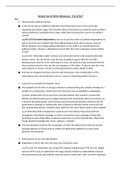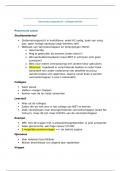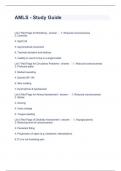No:
1. Dominated by political interests
● In the UK, the lack of codified constitution means that there aren’t many clear rules
regarding referendum usage. This therefore allows referendums to solely be used as political
tools as politicians manipulate their usage, while often throwing the country into political
turmoil
🡺 e.g The 2014 Scotland independence was run to put the matter of Scottish independence to
bed as Cameron was confident that the Scottish people would vote to remain, however
Nicola Sturgeon was creating political disruption, so he called it as it would benefit his
political position. However, disagreement arose after the result as Sturgeon wants another
in 2023
🡺 e.g 2016 EU referendum when Cameron was convinced that the vote would be decisively
Remain. Hence, he only did it to stop the loss of political support after 81 Cons MPs
disobeyed and voted for an EU referendum in 2011, not because it was necessarily best for
the country but best for him, yet this cost taxpayers £130 million. To give an idea this is the
same amount of money cut from crucial programmes to tackle obesity in 2022
● This has not changed over time: since the UK referendum on EC membership in 1975,
referendums have constantly been used as a means of alleviating political pressure
2. Issues are too complex for inexpert voters
● Most people lack the time or energy to devote to understanding the complex minutiae of a
problem in a referendum, which leaves the electorate more susceptible to exploitation
🡺 e.g Many people didn’t know about the intricate problems that would be created with
Northern Ireland if Brexit were to happen because of its land border with an EU country. As
a result of this going ahead, severe tensions have formed with Northern Ireland as the UK
government’s attempt to change trade rules is placing an effective border across the Irish
Sea, undermining Northern Ireland's place within the UK. All of which could’ve been avoided
🡺 e.g In 2016 this political inexperience could be seen from the fact that many believed
propaganda in the Brexit campaign, as voters accused the Leave campaign of lying after
promising an extra £350 million to NHS per week from cost of EU membership. Afterwards
Farage denied the pledge after result, calling it a "mistake”.
● This has worsened since the rise of populism, in which the advent of the internet and the
growing influence of social media in politics has allowed for politicians to more easily
galvanise the electorate.
3. Referendums do not solve the problem
● Regardless of which side wins, the issue vary rarely goes away
🡺 e.g The 2011 AV referendum saw a huge 69% majority voting to keep FPTP over AV, largely
because FPTP is easy to understand. This huge majority should’ve ended debate, however
the Liberal Democrats still called for electoral reform in their 2015, 2017 and 2019 manifesto
, as they believe that it was because it was only for AV and not their chosen STV. If the Lib
Dems were to get back into government, they would call for another referendum, and some
in the Labour party also support it.
🡺 e.g 2016 EU referendum caused, according to BMG Research, 8% of the UK to fall out with a
friend over Brexit, and 6% to stop speaking to a family member. Brexit continued for nearly 4
years after, with it being the focus in the 2019 general election, as the Conservatives led with
the slogan “Get Brexit Done”, while Labour wanted a second “people’s vote”. This issue
being the forefront for so long inevitably caused divide among parties and people.
● This is significant as democracy is attempting to unify the country around common ground,
but direct democracy only acts to further polarise.
Yes:
1. Gives greater democratic legitimacy to constitutional arrangements
🡺 E.g., 1975: In UK European Communities membership referendum, the electorate
expressed significant support for EC membership, with 67% in favour. In a pamphlet,
Harold Wilson said: “Now the time has come for you to decide. The Government will
accept your decision – whichever way it goes”
🡺 E.g., 2011: UK Alternative Vote referendum, concerning whether or not to replace
FPTP with AV, was rejected by 67.9% of voters, giving decisive democratic
legitimacy to FPTP in the face of reformist pressure dating back to New Labour’s
seizure of power in 1997.
● Legitimacy varies with low/high turnout
2. Encourages greater political participation
● The key to any strong democracy is high political participation, and direct democracy
helps to galvanise political interest in the previously uninterested, increasing
participation
🡺 e.g 2016 EU referendum the turnout was 72%, and the 2014 Scotland Referendum
was 85%, despite average turnout in the 21st century being 67%
🡺 e.g In 2015, the turnout was 71% in Scotland after the referendum, up by 7%, and
firmly above the UK’s average turnout of 66%. This fits this hypothesis as there was a
whopping swing of 30% to the SNP who have long wanted Scottish independence,
seeing them gain 50 seats
● Referendums are most useful in this regard when their issue is more contentious:
when they are able to significantly polarise the electorate, it also gives them incentive
to find a party who aligns with their views on the issue in question.
3. Society would now benefit from more referendums
● The internet allows information to be easily accessible, so people can now make
educated, informed decisions about what they believe is the best option





